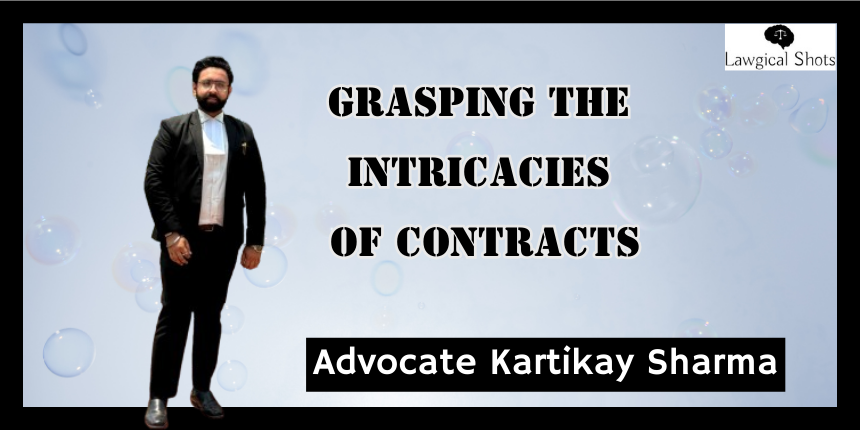Do your hands shake with anxiety when you are about to sign an agreement? Do you find it difficult to agree to the terms of a contract? Does the legal jargon in contracts haunt you? These are the symptoms of lack of knowledge regarding legal english and law of contracts. That is why having a legal expert by your side is always recommended when you are signing up for something which has a lot of interests at stake, whether personal or financial. With this, Lawgical Shots introduces Advocate Kartikay Sharma, an expert whom we approached with the request to share his proficiency in contracts and answer some of our queries related to the Law of Contracts.
Grasping the Intricacies of Contracts with Adv. Kartikay Sharma
Advocate Kartikay Sharma has been kind enough to give crisp and clear responses to all our questions. To catch up on the same and get acquainted with the complexities surrounding Contracts in India, read below:
Q. What we studied in Contract Law Theory is that Offer + Acceptance + Legal Enforceability makes up a valid contract. Is it that simple when practically dealing with Contracts?
Advocate Kartikay Sharma: The basic elements of a contract—offer, acceptance, and legal enforceability are undoubtedly the essential parts of any contract. However, in practical, dealing with contracts is often more complex due to several additional factors:
- Terms & Scope of services
- Obligations of the parties
- Consideration
- limitation of liability
- Indemnification
- Termination & Termination on breach of the obligations of a party
- Non-compliance with statutory requirements
In addition, relevant legal provisions may result in the contract being rendered null and void, thereby affecting its enforceability and legal validity, capacity of parties to enter into a contract, etc. Therefore, all the aforementioned factors must be meticulously taken care of while practically dealing with contracts
Q. As someone who is experienced in Contract Drafting, what is your approach? To keep it simple and straightforward for the layman to understand, or more use of technical/legal jargon?
Advocate Kartikay Sharma: Well, here I would prefer a mixed approach, as I reckon that a contract must contain terms or words that are easily understandable, even by a layman who is a party to the contract. At the same time, the lawyer drafting the contract should not ignore the essential legal jargon, which exhibits expertise, dedication, and acumen in tailoring a beautifully drafted contract.
Q. How difficult is it to determine the legal validity of a contract?
Advocate Kartikay Sharma: Determining the legal validity of a contract involves checking if it meets key criteria of a valid contract:
a. Offer and Acceptance: Clear offer and acceptance by both parties.
b. Consideration: Exchange of value between parties.
c. Intention: Both parties intend the contract to be legally binding
d. Capacity: Legal ability of parties to enter the contract.
e. Free Consent: Agreement without coercion, fraud, or mistake.
f. Legality: The contract’s purpose must be lawful.
g. Formalities: Contracts need to be in writing with proper execution including stamping and signatures of both the parties.
Q. Signing employment contracts is common for people in the service sector. What is that one thing which employees should take care of while negotiating terms of their Employment Agreement?
Advocate Kartikay Sharma: When signing an employment contract, one crucial thing employees should take care of is the non-compete clause. This clause can restrict an employee’s ability to work for competitors or start a similar business for a certain period and within a specific geographic area after leaving the company. It’s important to ensure that the non-compete terms are reasonable and don’t unfairly limit future career opportunities.
For instance: Wipro, a leading IT services company, filed a legal complaint against its former healthcare head Mohd Haque and Jatin Dalal, its former CFO, who joined its competitor Cognizant, alleging that they violated non-compete clauses in their employment contracts. Thus, one should be vary of such terms while signing an employment contract.
Q. As a party, is it better to draft contracts with terms favouring me, or should the interests of both the parties be addressed at the first go? How do you approach contract negotiations to ensure both parties are satisfied with the terms?
Advocate Kartikay Sharma: During negotiations and drafting the final contract, there must be a balanced approach in order to foster a sustainable and successful business relationship between the parties. In light of this, indemnification and limitation of liability clause should be meticulously drafted.
Also read – Offer and Acceptance Case Laws
Q. As a Practitioner, what is the importance of Contract Lifecycle Management?
Advocate Kartikay Sharma: Contract Lifecycle Management (CLM) is essential for legal practitioners as it streamlines processes, mitigates risks, ensures compliance, and enhances overall contract performance.
Q. Have you been involved in any post-contractual disputes or enforcement actions? When it comes to disputes among parties to contract, would you suggest Alternative Dispute Resolution (ADR) or traditional litigation is a better option?
Advocate Kartikay Sharma: Yes, definitely! I have been involved in a recent case of a company where the parties first tried to settle their monetary matters through conciliation in the Micro and Small Enterprise Facilitation Council (MSEFC) but were unsuccessful. Subsequently, they are attempting to resolve the alleged case through arbitration, which, in every way, is a better option than traditional litigation.
Q. What is your suggestion for anyone about to sign a contract? What are the key pointers that he/she should practice to avoid any potential risks?
Advocate Kartikay Sharma: When signing a contract, it’s essential to be diligent and informed to avoid potential risks. Furthermore, every page of a contract must be properly signed along with the stamp (if any) as signing every page and stamping can enhance the validity of a contract.
We would like to thank Advocate Kartikay Sharma while sincerely appreciating his knowledgeable insights and the knowledge he shared. We hope that his valuable contribution helps people who otherwise find it challenging to understand the nitty gritties of contracts.








